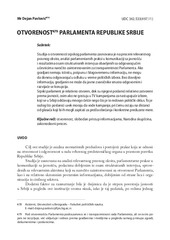Приказ основних података о документу
Openness of the Parliament of the Republic of Serbia
Otvorenost Parlamenta Republike Srbije
| dc.creator | Pavlović, Dejan | |
| dc.date.accessioned | 2021-04-02T11:52:18Z | |
| dc.date.available | 2021-04-02T11:52:18Z | |
| dc.date.issued | 2009 | |
| dc.identifier.issn | 1820-6700 | |
| dc.identifier.uri | http://rfpn.fpn.bg.ac.rs/handle/123456789/212 | |
| dc.description.abstract | The study on the openness of the Serbian Parliament is based on the assessment of the relevant legal framework, analysis of the parliamentary practices in communication with the public, and the input from the eight structured interviews conducted with the relevant stakeholders particularly interested in the transparency of the Parliament. If the citizens do not have true, complete and timely information, they can not exercise their judgment when it comes the time for the political choices. Without sufficient information, a citizen can not hold public officials accountable, and corruption would prosper. Serbian Parliament is relatively open, while the deputies are relatively closed towards the public, unless they are guests in some TV show campaigning for the forthcoming elections, which are taking place in Serbia much more often than the regular political cycle is. That is why deputies always have to run campaigns, while remaining distant from the voters who could ask them for past promises and concrete measures taken. | en |
| dc.description.abstract | Studija o otvorenosti srpskog parlamenta zasnovana je na proceni relevantnog pravnog okvira, analizi parlamentarnih praksi u komunikaciji sa javnošću i rezultatima osam strukturiranih intervjua obavljenih sa odgovarajućim učesnicima naročito zainteresovanim za transparentnost Parlamenta. Ako građani nemaju istinitu, potpunu i blagovremenu informaciju, ne mogu da donesu odgovarajuću odluku u vreme političkih izbora. Bez dovoljno informacija, građanin ne može da javne zvaničnike smatra odgovornim i razvijaće se korupcija. Srpski parlament je relativno otvoren, dok su njegovi poslanici relativno zatvoreni prema javnosti, osim ako ne gostuju u TV kampanjama za nastupajuće izbore, koji se u Srbiji održavaju mnogo češće nego što je to redovan politički ciklus. To je razlog što poslanici uvek moraju da vode kampanje, pri čemu ostaju na distanci od glasača koji bi ih mogli zapitati za prošla obećanja i konkretne preduzete mere. | sr |
| dc.publisher | Univerzitet u Beogradu - Fakultet političkih nauka, Beograd | |
| dc.rights | openAccess | |
| dc.source | Godišnjak Fakulteta političkih nauka | |
| dc.subject | openness | en |
| dc.subject | free access to information | en |
| dc.subject | National Assembly | en |
| dc.subject | legislative process | en |
| dc.subject | otvorenost | sr |
| dc.subject | slobodan pristup informacijama | sr |
| dc.subject | Narodna skupština | sr |
| dc.subject | zakonodavni proces | sr |
| dc.title | Openness of the Parliament of the Republic of Serbia | en |
| dc.title | Otvorenost Parlamenta Republike Srbije | sr |
| dc.type | article | |
| dc.rights.license | ARR | |
| dc.citation.epage | 336 | |
| dc.citation.issue | 3 | |
| dc.citation.other | 3(3): 325-336 | |
| dc.citation.rank | M51 | |
| dc.citation.spage | 325 | |
| dc.citation.volume | 3 | |
| dc.identifier.fulltext | http://rfpn.fpn.bg.ac.rs/bitstream/id/86/209.pdf | |
| dc.identifier.rcub | https://hdl.handle.net/21.15107/rcub_rfpn_212 | |
| dc.type.version | publishedVersion |

